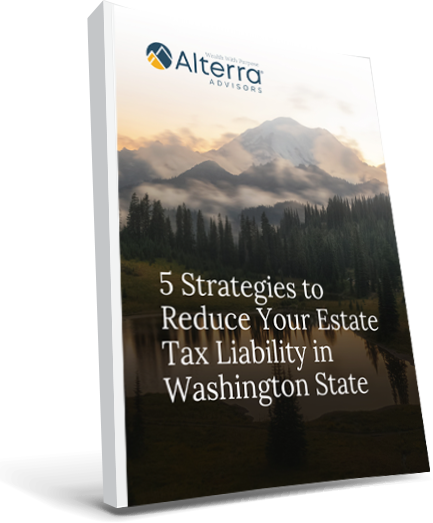Estate taxes are among the most frustrating and confusing topics, according to our clients. We also hear that trusts and other estate planning solutions are even harder to understand than the tax itself. But with the estate tax exemption – the amount you can pass tax free – set to cut in half in 2026, you might also feel like the clock is ticking, slowly backing you into a corner filled with important but uncertain decisions to make.
If so, we’ve found that finding ways to reduce your estate tax and pass more to the people you care most about doesn’t have to be as complicated as it first seems.
Here are five easy ways to move assets out of your estate, reducing potential estate tax and increasing your impact on loved ones.
How does the estate tax work?
Before getting into strategies to reduce your potential tax, let’s start by understanding the tax itself. The estate tax, often referred to as the “death tax,” is a tax on the transfer of property at death. The federal tax applies to an estate’s value above a certain threshold, which is $13.99 million for individuals and $27.98 million for married couples in 2025. This means that estates valued below these amounts are not subject to estate tax. However, this tax-free exemption is set to cut in half on 1/1/2026 unless revised legislation is passed.
Many states also impose a state estate tax. Our home state of Washington imposes up to 20% in tax on estates above $2.193 million. To learn which assets you pay estate tax on, click here.
5 easy ways to move assets out of your estate
Moving assets out of your estate through trusts and other estate planning strategies can be very effective to reduce your tax exposure. But if you’re interested in simple strategies you can use today, here are five easy ways to start.
- Gifting: One of the easiest ways to move assets out of an estate is through gifting. You can give up to $19,000 per recipient without incurring any gift tax or affecting your lifetime estate tax exemption. For example, if you’re married with three kids and seven grandkids, you could give away $380,000 this year. (10 recipients x 2 gift-givers x $19,000 gift limit = $380,000). Once you hit this limit to an individual, additional gifts to that person start reducing your $13.99 million lifetime exemption amount.
- Utilizing Annual Exclusion Gifts: In addition to the $19,000 annual gift exclusion, payments made directly to educational institutions for tuition or to healthcare providers for medical expenses do not count towards the annual or lifetime gift exemption. So, if you’ve hit your annual gift limit and want to help with college expenses, you can still make payments directly to the university without incurring any gift tax.
- Charitable Donations: Gifts to charity, either today through direct gifts or tomorrow by leaving them as a beneficiary when you die, are not subject to the $19,000 gift limit and reduce the size of your taxable estate. Because qualified charities don’t pay income tax, leaving your retirement accounts to charity also avoids the income tax that would otherwise be due on those funds! Want to give a lump sum now but give over time? Consider a Donor Advised Fund.
- 529 College Savings Plans: Contributions to these plans are considered gifts, and up to five years of contributions can be made at once without triggering the gift tax. You can be the owner of the account and maintain control over the funds, but these accounts are considered outside your estate for tax purposes. Learn more about 529s and estate planning.
- Uniform Transfers to Minors Act (UTMA): UTMA accounts allow minors to receive gifts without the need for a trust. An adult manages the assets in the UTMA account until the child reaches the age of majority. Contributions to UTMA accounts are subject to the annual gift tax exclusion, making it an efficient way to transfer wealth and reduce the taxable estate.
Beyond these simple steps, setting up certain types of trusts can effectively move assets out of your estate and, with the right team, it doesn’t have to be as complicated as it seems.
With the 2025 estate tax sunset closing in, it’s important to start planning now. Contact us to discuss your situation and we can help you build the right financial and estate planning team to understand the best strategies to reduce taxes and increase your impact on the family and causes you care most about!
The “Alterra” name was coined by joining the Latin roots “alter”, the origin of the word “altruism” with “terra” meaning earth or land. This name reflects the company philosophy of “clients before profits” and providing firmly grounded advice.


